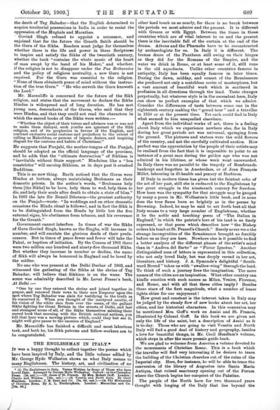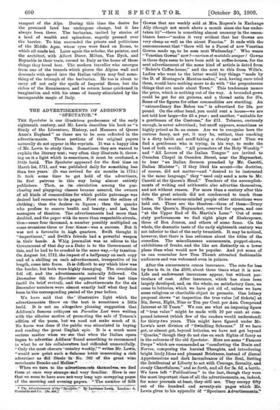THE ENGLISHMAN IN ITALY.* IT was a happy thought to
collect together the poems which have been inspired by Italy, and the little volume edited by Mr. George Hyde Wollaston shows us what Italy means to many Englishmen. The history, art, and civilisation of no
• (1) Tito Englishman in Italy. Verses Written by Some of Those who have Loved Italy. Arranged by George Hyde Wollaston. Orford ! at the Clarendon Press. [5s. net.]—(2) Assisi of St. Francis. By Mrs. Robert Goff. London : Chatto and Windus. DOB. net.]—(3) Venetia and North Italy. By Cecil Headlam. London J. si. Dent and Co. [7s. 6d. net...]—(4) The Monunumts of Christian Rome. By A. L. Frothingtam. London : Macmillan and Co.
am, 61)
other land touch us so nearly, for there is no break between the periods we most admire and the present. It is different with Greece or with Egypt. Between the times in those countries which are of vital interest to us and the present there is the inevitable fall of the curtain at the end of the drama. Athens and the Pharaohs have to be reconstructed by archaeologists for us. In Italy it is different. The bronze doors of the Pantheon still swing on their hinges as they did for the Romans of the Empire, and the water we drink in Rome, or at least some of it, still runs in the old aqueducts. Unlike other countries famous in antiquity, Italy has been equally famous in later times. During the dawn, midday, and sunset of the Renaissance she produced not only a matchless series of masterpieces, but a vast amount of beautiful work which is scattered in profusion in all directions through the land. Taste changes perpetually, but whatever style is in the ascendant here, Italy. can show us perfect examples of that which we admire. Consider the differences of taste between some one in the eighteenth century making the "grand tour" and a traveller in 1850 or at the present time. Yet each could find in Italy what seemed to him unequalled elsewhere.
Apart from the individual works of art, there is a feeling about Italy which we experience nowhere else, for in Italy during her great periods art was universal, springing from the ground. The pictures and statues were the wild flowers of the country, and not the carefully cultivated exotics. How perfect was the appreciation by the people of their artists may be realised from the fact that it is impossible to point to an instance of a great man during the golden age who was not admired in his lifetime, or whose work went unrewarded. In Italy there was no parallel to the tragedy of Rem'brandt, bankrupt and forgotten in Amsterdam, or of Jean Francois Millet, labouring in ill-health and penury at Barbizon.
If Italy in modern times has given but the faintest echo of the art of her past, still she is endeared to the Englishman by her great struggle in the nineteenth century for freedom.
How keen was the sympathy for that struggle may be kauged
by many a poem in Mr. Wollaston's little book, and in none does the true flame burn so brightly as in the poems by Browning. Indeed, he may be said to set forth beat all that Italy means to a very large number of Englishmen, whether it be the noble and touching poem of "The Italian in England," in which the patriot's love of his land is so finely expressed, or that poem which describes how "the Bishop orders his tomb at St. Pmxed's Church." Surely never we' e the strange incongruities of the Renaissance brought so forcibly before us as they are here. Nowhere else is it possible to find a better analysis of the 'different phases of the artist's mind than in "Andrea del Saito" or " Pictor Ignotus." Another distinguished man of letters is represented in this collection, who not only loved Italy, but was deeply versed in her art, literature, and history. J. A. Symonds's delightful " South- ward Bound" takes us with "swallow-wing" thvough the land. To think of such a journey fires the imagination. The mere names of the cities are an inspiration. What other country can kindle emotion with such names as Milan, Venice, Florence, and Rome, and with all that these cities imply ? Besides these stars of the first magnitude, what a number of lesser lights shine for our enjoyment !
How great and constant is the interest taken in Italy may be judged by the steady flow of new books about her art, her cities, and her historical characters. In this connexion may be mentioned Mrs. Goff's work on Assisi and St. Francis, illustrated by Colonel Goff. In this book we are given not only the life of the saint, but a description of Assisi as it is to-day. Those who are going to visit Venetia and North Italy will find a good deal of history and geography, besides a love for beautiful things, in Mr. Cecil Headlam's volume, which steps in after the more prosaic! guide-book.
We are glad to welcome from America a volume devoted to the monuments of Christian Rome. This is a book which
the traveller will find very interesting if he desires to trace
the building of the Christian churches out of the ruins of the Imperial city. Here, for instance, he will be able to.trace the
conversion of the library of Augustus into Santa Maria Antigua, that ruined sanctuary opening out of the Forum where the Church begins her conquest of the Palatine.
The people of the North have for two thousand years thought with longing of the Italy that lies beyond the rampart of the Alps. During this time the desire for the promised land has undergone change, but it has always been there. The barbarian, incited by stories of a land of wealth and splendour, eagerly pressed over the barrier. To him succeeded the priests and politicians of the Middle Ages, whose eyes were fixed on Rome, to which all roads led. Later again the scholar, the painter, and the architect, with Albert Diirer, Milton, Van Dyck, and Reynolds in their train, turned to Italy as the home of those things they loved best. The modern traveller who emerges from one of the tunnels which pierce the Alpine wall and descends with speed into the Italian valleys may feel some- thing of the triumph of the barbarian. He too is about to carry off not only the spoils of Imperial Rome, but the riches of the Renaissance; and to return home quickened in imagination and with his sense of beauty stimulated by the incomparable magic of Italy.











































 Previous page
Previous page